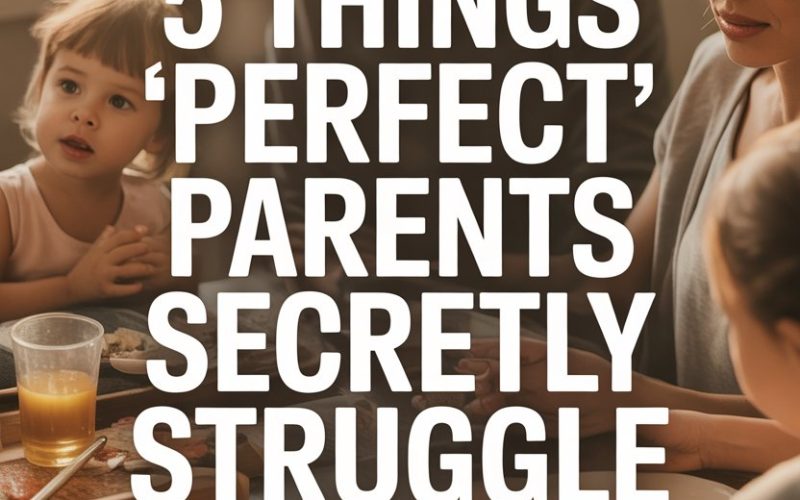Ever glanced at another mum or dad at the school gate—the one with the dazzling smile, fuss-free kids, and not a hair out of place—and thought, “How do they do it?”
Secret’s out: even the “perfect” ones are winging it more than you think. In the spirit of solidarity and a friendly reality check, here’s a peek behind the curtain.
Turns out, nobody has it all together.
1. The Myth of Effortless Patience
You know those serene, zen-like parents who never raise their voice, even when their child is performing an interpretive dance in the middle of Tesco?
They’re not magical creatures. They’re just experts at internal screaming.
The truth is, patience isn’t some mystical wellspring—it’s more like a phone battery that drains throughout the day.
Even the calmest parents have moments where it takes Herculean effort not to morph into a banshee. According to Dr. Laura Markham, clinical psychologist, every parent feels their limits being pushed, sometimes hourly.
What helps? Micro-breaks. As silly as it sounds, hiding in the loo for 60 seconds to breathe can genuinely reset your mental state.
And here’s a secret weapon: the “mouthful of water” trick.
If your patience is wearing thin, take a sip and hold it in your mouth. You can’t yell with your cheeks puffed out.
Plus, your kids might run off giggling, thinking you look like a goldfish. Win-win.
2. Keeping Up With the Comparison Trap
Perfection’s best friend is comparison. Social media has turned parenting into an Olympic sport—complete with judges, medals, and a highlight reel of everyone else’s gold-medal moments.
But those curated snapshots rarely show the unfiltered chaos.
Even the most “together” parents feel that twinge scrolling past another family’s color-coordinated holiday photo or reading about Little Johnny’s violin recital/triple language fluency/charity fun run.
According to an article published in Healthline, nearly everyone—not just new parents—gets sucked into the trap.
This is your permission slip to mute accounts that make you feel more “meh” than motivated. Instead, follow those sharing the messy bits too.
If you’re itching to post your own highlight, do it! But balance it with a reminder (to yourself and others) that everyone’s life has outtakes.
3. The Juggle Between Work and Parenting (or Just Existing)
Some parents seem to glide seamlessly between Zoom meetings, packed lunches, and bedtime stories.
But behind the scenes? There’s a lot of frantic text messaging, strategic snack placement, and occasionally a child popping up in a business call—pants optional.
A 2022 Pew Research study found that more than 60% of parents frequently worry they’re not spending enough “quality time” with their kids.
The rest are probably too tired to worry. Even those with flexible schedules feel the grind.
Try stealing little moments back, rather than chasing a mythical perfect day. Ten-minute “screen-free” chats, kitchen discos before dinner, or reading together for five minutes at bedtime can build connection.
And if you’re working from home, give yourself permission to say, “Mum/Dad is busy—five more minutes.” Boundaries teach kids resilience and respect for others’ time.
4. Guilt That Lurks in the Shadows
Ah, parental guilt—the gift that keeps on giving.
Doesn’t matter what you do: too much screen time? Guilt. Not enough kale in their dinner? Guilt. Didn’t sign them up for Mandarin lessons aged three? Guilt, guilt, guilt.
Even those families who appear to have it all sorted admit to feeling constantly scrutinised—by relatives, strangers in the park, the family WhatsApp group, and themselves.
Dr. Brené Brown, researcher and author, says guilt is inevitable for parents because we care so much.
Here’s something you can try tonight. Write down three things you did “well enough” as a parent today, even if they’re tiny.
Brushed someone’s hair? Tick. Lied about carrot cake being “energy bars”? Tick. Showed up, hugs at the ready? Big tick.
Guilt loses its power when you stack up the wins—even the small, silly ones.
5. The Illusion of Consistent Confidence
Ever met a parent who seems to have an answer for everything—discipline, dietary needs, developmental milestones? They might sound like a walking encyclopedia, but inside, the panic is real.
Every parent faces moments of doubt.
Am I too strict? Too soft? Should I be blending kale into their smoothies? According to research ,questioning your choices is not only normal—it shows you care.
The real “secret” isn’t pretending you know it all. It’s learning to say, “I’m not sure, but I’ll find out.” Or, better yet, “What do you think?”
Getting your child involved in decision-making (even if it’s just choosing between broccoli or peas) can boost their confidence—and yours.
For an extra boost, connect with parents you trust.
Group chats or school WhatsApp groups can be a lifeline, not just for sharing lost jumper alerts but also for reassuring you that yes, everyone’s child is refusing to wear a coat in January.
Perfect Doesn’t Exist—But Connection Does
Here’s the secret every “perfect” parent wishes someone had told them: nobody’s got it sorted.
Everyone’s got their own blend of chaos and occasional brilliance. Nobody is serving up organic, hand-spiralized courgette ribbons every night—sometimes it’s fish fingers and a hope for the best.
The best families aren’t the ones with spotless houses or gold-star lunchboxes. They’re the ones who laugh, admit when they’ve mucked up, and keep showing up for each other.
If you’re feeling the pressure, let a little reality in. Trust me, behind closed doors, everyone is just trying to make it through with love (and, ideally, their sanity) intact.
Tonight, give yourself a pat on the back. You’re doing better than you think.
And if you’re still not convinced—ask your kids what they love most about you. Their answer will usually be something wonderfully random, proving yet again: for them, you’re already more than enough.




